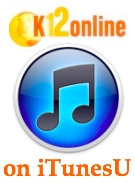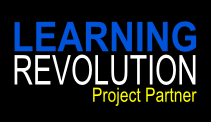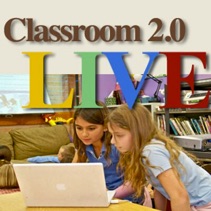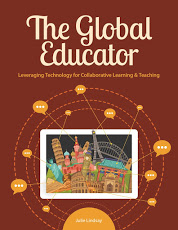Bud Hunt
Fort Collins, Colorado, USA
Blog: http://budtheteacher.com
Twitter: @budtheteacher
Presentation Title
“Journey through the Week as I Journey Up (or Down) the Road”
Bio
Bud Hunt teaches high school language arts and journalism at Olde Columbine High School in Longmont, Colorado.
(Since this presentation is audio-only, a YouTube version is not available)
Presentation
http://k12online.wm.edu/a_journey.mp3
While it’s certainly an honor to have been asked to deliver the keynote for the “A Week in the Classroom” portion of the first of what I hope will be many K12 Online Conferences, I have to admit that, after the excitement of being asked to contribute, I was a bit perplexed. Still am. Sure, I’m using this new web in my classroom when I can, and I am fascinated by the blurring of the borders between my classroom and pretty much the entire rest of the world, but I’m not an “expert” when it comes to Web 2.0. None of us are. That’s one of the best parts of exploring these spaces with our students — they and we and us are all traveling together, on a real exploration of a new frontier, a frontier of ideas.
I certainly hope that we don’t tame this frontier too much, and that there are always wide open spaces in some parts, sandy beaches in others, and, not to take this metaphor too far, a few rocky peaks always looming in the distance, transfixing us with both their beauty and the horrific jagged edges that they add to the horizon. Some folks, many of them my teachers, have been living in this space for some time. Lots more folks enter this world every day. Everyone, novice and experienced, teacher and student, brings their ideas and experiences with them, ready to share with the world. As problematic and essential as school, education, teaching, and learning are, there’s plenty of room — and some real, legitimate need — for all of that conversation and learning and juxtaposition and re-mixing of ideas. If you haven’t already, make sure that you know how to contribute to the conversation, David Warlick suggested several tutorials for getting started.
I hope you’re enjoying your exploration of the Read/Write Web. I hope you’re learning. Better still — I hope you’re sharing what you notice as you travel along the road . . . or leaving the (t)rail(s) entirely. Teachers do not traditionally have voices outside of their classrooms. We sit, alone, in little rooms, studying and grading and feeling lonely. It doesn’t, and shouldn’t, have to be that way.
My last hope for you, whoever, wherever, and whenever you are, is that you’re doing good work, with your students, and that you’ve discovered that the work that you are doing is so important, so vital and so necessary that you shouldn’t keep it to yourself. The Internet won’t run out of room anytime soon.
When Robert Fulghum (http://www.robertfulghum.com/) ended Uh-Oh: Some Observations from Both Sides of the Refrigerator Door, he made mention of the fact that Pueblo pottery contains a particular line break in every pattern to represent that, while a particular piece might be completed, the life of the artist is not. “A ritual sign of continual possibility,” he called it (246). To model that same idea, he ended his book not with a period, but a semi-colon. I shall do the same here, but for a slightly different reason. For me, I do so as a reminder that, no matter how many words we write, speak, draw, sing, or otherwise utter, there still remains much to discuss;
Works Cited
Fulghum, Robert. Uh-Oh: Some Observations from Both Sides of the Refrigerator Door. New York: Ballantine Books, 1991.
Links Mentioned (or neglected) in the Podcast
A Conversation about Elgg in the Classroom
http://edtechtalk.com/node/254
Blogessor
http://blogessor.blogspot.com/
Elgg
http://www.elgg.org/
EducationBridges.net
http://educationbridges.net/
My Learning Network
http://www.bloglines.com/public/budhunt
Olde School Space
http://www.oldeschoolspace.org/
Teachers Teaching Teachers
http://www.teachersteachingteachers.org/
Will Richardson
http://www.weblogg-ed.com/
Worldbridges
http://www.worldbridges.net/
Youth Voices.net
http://www.youthvoices.net/
All music in this podcast by the group “La Grosse Couture,” via BeatPick.com (http://www.beatpick.com/).








Pingback: K12 Online Conference: Day 1 at teaching.mrbelshaw.co.uk
Nice work, Bud! (It’s also great to see another Coloradoan here)
I really enjoyed your approach to your keynote. I felt like I was along for the ride in the car or sitting on the patio listening to the thunder. It was good to follow your thought processes and hear about the ideas and issues you face with your students. I’ll be listening to this again, but just at first blush, your comments are valuable and important to the world of education. Thanks for sharing your expertise with the rest of us.
Hi Bud,
I too enjoyed your keynote, it was really nice to get your perspective and peeks into your classroom routine.
IMHO – Just looking at it from a different perspective – hopefully district filters will improve in order to have a local overide for educators such as yourself, but I’m not sure all educators are at the same point as you, with regards to teaching their classes about information literacy. Although, I want them to, that doesn’t mean that they are doing so. I think that’s where filters for younger students in particular are useful. When we don’t have 100% compliance to an AUP, or teachers till send their kids to computers to “play” unsurpervised, and we are not teaching students to be safe online then there is the offer of at least minimal protection.
Another point – make sure you have educators at the helm on who decides what is filtered. That way you can explain the educattional purpose and have content unblocked, whether temporarily or not. Although this does effect serendipity, it requires a bit of preplanning and previewing content before in is displayed in the classroom. Not necessarily a bad thing.
Take Care and again I really enjoyed your podcast keynote.
Bravo…We think alike…but you articulate much better!
Thanks for taking the time.
Lots of good points Bud! Thanks for sharing your podcast.
I agree! It is important to teach students how to converse, listen to each other, colloborate – whether in groups in the same room or in the distance.
Assessing these skills is another issue – but so important. That’s why I think it’s critical to ask students to reflect in writing on what they’ve learned after a group discussion and WHO they learned it from. How did they move the group forward – what contribution did they make that did that?
And then you bring up the issue of translating into grades – Thanks for helping me realize other educators rassle with the same issues.
Hi Bud!
Your enthusiasm is infectious.
You say: “Everyone, novice and experienced, teacher and student, brings their ideas and experiences with them, ready to share with the world.” And here comes the novice… Having resisted the temptation of stepping off the well- trodden track for a while now, I am truly excited about “travelling together” to discover the world that has many of my colleagues, as well as our students, deeply entwined…or should I say, freed up to fly off into the unknown…
Really enjoyed your “keynote”, Bud! Wonderful to spend a “week” driving around with you while still driving my own car.
You had me thinking long and hard about all the levels of “access” that we need to examine and address.
Pingback: Bit By Bit » Blog Archive » Reflection to Bud Hunt’s Keynote Podcast (k12Online Conf.)
Hi Bud, While I listened to and enjoyed your keynote, I listened while at home in my living room, the power punch for me was your explanation at the end of your blog account about Rober Fulghram. That describes how I feel and how I accept and celebrate that many Web 2.0 tools are about the conversation;
Bud,
Thank you for putting together a unique keynote. I always say to my students, “life is about working smarter not harder.” Your podcast style takes full advantage of that. I can identify the idea of being on the road at 6:30 am with your children in the backseat (as I do the same thing).
Your struggles with content filtering is a major issue many of us face on a daily basis. Keep fighting the good fight.
Thanks so much, everybody — it’s quite cool that this presentation is still useful to folks almost a year after it was delivered.
I’m looking forward to learning from all y’all during this year’s conference.